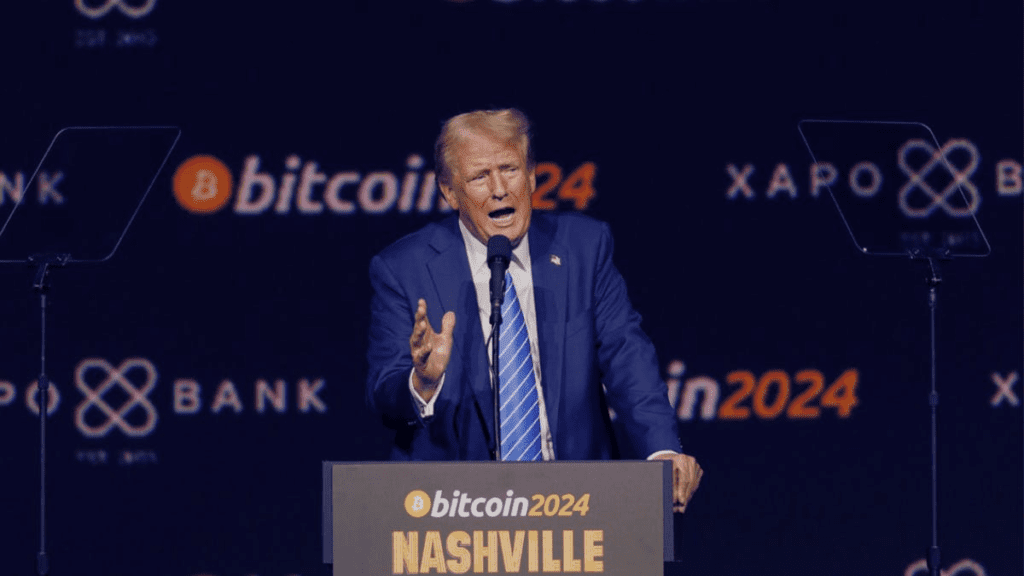We are just days away from the US presidential elections. Trump and his teammates have promised a more liberal approach to crypto than that of the Democrats. In addition, the Republican candidate is leading on Polymarket and even in some polls as a potential winner. In this article, I would like to outline possible improvements to US crypto regulations that Donald Trump could make.
While Kamala Harris only mentioned cryptocurrencies for the first time at the end of her campaign, Trump has talked about them a lot this year. He has hosted personal events and meetings focused on cryptocurrency, including his speech last July at the Bitcoin Conference in Nashville.
During the event, the Republican candidate promised that he would not authorize the creation of CBDC, the digital dollar, so as not to restrict Americans’ financial freedom. Additionally, Trump promised to create a strategic Bitcoin reserve and emphasized that the US government under his leadership would no longer sell Bitcoin and would hold it. Additionally, he highlighted the creation of a special task force for US crypto policy – the Presidential Advisory Council on Bitcoin and Crypto.
The Republican Party platform also has a paragraph dedicated to crypto – about protecting Americans’ right to own their own assets: “We will defend the right to mine Bitcoin and ensure that every American has the right to have its own assets. Digital assets and transact without government oversight and control.
And Republicans still insist they won’t allow the creation of CBDC, the government’s digital currency. This point is above all important for libertarian voters and wealthy Americans. After all, CBDC, by its properties, implies even greater government control over currency than classic fiat currency.
Bitcoin Bill
At the Bitcoin conference, where Trump lavished his promises on Bitcoiners, Republican Senator Cynthia Lumis also spoke. Let’s talk more about this senator and his legal initiatives. Just before the conference, she presented the Bitcoin Strategic Reserve Bill.
The bill shortly determines that the US government will retain its current Bitcoin reserve and additionally purchase 1 million Bitcoin. The law requires the United States to buy bitcoins for 5 years, or at least 200,000 per year. And the total amount for this period is 1 million BTC. Also the creation of a transparent proof of reserve system. The law also prohibits the sale of bitcoins already in the government’s possession.
If Trump is elected, he will certainly favor the bill – but its passage depends on the position of Congress and the Senate. If the Republicans have the majority there, there is little doubt. On the other hand, the Democrats could at least modify certain provisions of the bill, or even argue for its rejection, considered populist and risky for public finances. However, there are also Democrats who support this bill, such as Democratic Rep. Ro Khanna.
What really matters for the future of crypto in the United States?
However, Trump’s promises to stop CBDCs and create Bitcoin reserves are just the tip of the iceberg in the regulation of cryptocurrencies in the United States. What matters for crypto businesses and regular users is the regulation of cryptocurrencies across the country – rights of crypto users and opportunities for investors, licensing requirements for legal entities, as well as taxation of cryptographic gains. Let’s see how a possible Trump presidency might affect this.
In fact, there are at least two pieces of legislation more important than the Bitcoin bill to discuss here:
💡Financial Innovation and Technology for the 21st Century Act
💸Stablecoin Payment Law
The fundamental part of the new US legislation dedicated to cryptocurrencies, which is expected to be approved after the elections, is “FIT21” – the Financial Innovation of the 21st Century Act. It is a lengthy document that has already been approved by the US Congress and has bipartisan support: almost all Republicans and half of Democrats. However, the law was postponed by the US Senate until after the presidential elections.
The future of this law actually depends on the position of the future president of the United States and the results of the elections. Most importantly, this law will make crypto regulation safer in the United States – there are now multiple regulators in the country, each with their own stance on crypto: SEC, CFTC, FINCEN, IRS and a few others.
Many lawmakers believe that the SEC is abusing its powers and restricting the development of the cryptocurrency industry in the United States. Two SEC commissioners (Hester Pierce and Mark Uyeda) also talk a lot about it. The FIT21 law is key to making the crypto legal landscape more defined and transparent.
Given that Cyntia Lummis supported Trump’s Bitcoin reserve initiative and also worked on the Financial Innovation Act, alongside Congressman Patrick McHenry, there is no doubt that this legislation will be supported by Republicans after the election and that Trump, as president-elect, can support final approval of FIT21 in the Senate.
What about the Stablecoin law?
This law proposed by Cynthia Lummis and Kirsten Gillibrand (Democrat) creates a transparent framework for the regulation of stablecoins in the United States, since there are currently no clear regulations. The largest stablecoin issuers will be registered by the Comptroller of the Currency (OCC). The law bans algorithmic stablecoins and requires 1-to-1 supply. This also gives the Fed the power to control it. Small stablecoin issuers will be licensed at the state level.
The future of this law in the event of a Trump victory is more difficult to predict – which is why it was not submitted to a vote in Congress. Additionally, there is no official position from Tether, Circle and Coinbase on this matter. However, given that the law has the support of Republicans (Patrick McHenry, Maxine Waters, Cynthia Lummis) and also Democrats (Kirsten Gillibrand) – and its requirements for issuers can be characterized as a compromise, it could also be adopted after the presidential election. Unless, of course, the new administration declares a different stance towards stablecoin.
From my perspective, it is in the interest of the United States to make dollar-pegged stablecoins available to users around the world. In this regard, unfortunately, the position of Janet Yellen seems very strange, who pointed out the danger of investments of stablecoin issuers in US Treasury bonds. You can see that in the European Union, the local stablecoin market is growing slowly – it is subject to excessive regulation due to some MiCA requirements – which is too strict for crypto-backed stablecoins. ‘euro. I hope the new president and US lawmakers will establish more flexible regulations for stablecoins.
Why do Republicans (and Democrats) care so much about crypto?
By the way, let’s look at this election from a different perspective: Politicians aren’t just interested in innovation. Another possible reason why Republicans and Democrats are so strongly supportive of the crypto industry is the size of its campaign donations. According to Public Citizen, in 2024, crypto companies spent $119 million on federal elections. This represents 44% of total business spending. Most of the funding goes through a special PAC for the crypto industry, the Fairshake PAC. It is founded by Coinbase ($50 million), Ripple ($49 million), Jump Crypto ($15 million), Andersen Horovitz ($1.75 million), Payward, Circle, Paradigm and a few other backers.
Moreover, this structure finances not only Republican candidates, but also certain Democrats. According to Public Citizen, its task is also to prevent the election of those who have a bad attitude towards cryptocurrencies.
In May, Donald Trump’s campaign began accepting crypto donations and they brought in around $7.5 million according to CNBC. According to the Washington Post, crypto entrepreneur David Bailey promised Trump $15 million in donations before his visit to Nashvielle. Donald Trump also received donations from Gemini founders – Tyler and Cameron Winklevoss – $1 million in Bitcoin each. However, Harris and other Democrats also enjoy support from some cryptocurrency entrepreneurs, like Chris Larsen (Ripple) and Tim Drapper.
Of course, the monetary factor plays an important role, but we cannot ignore another element: the real mistakes of the outgoing Biden administration (and Gary Gensler) when it comes to regulating cryptocurrencies. The FIT21 Act, which gained bipartisan support in Congress, was never passed. Without normal cryptocurrency regulation, the United States simply cedes its position in the cryptocurrency market to other countries.
Conclusion
The need to pass new crypto bills is long overdue and as lawmakers realize, her main opponent – Gary Gensler, is likely to resign from his position even if Harris wins the election. However, Republicans and Trump now have a clearer stance on this issue – as a party traditionally more loyal to businesses and investors.
The approval of the Bitcoin Strategic Reserve Act will be important news for the cryptocurrency investment market and will certainly be one of the actions of the new Trump administration. However, for everyday Americans, it is just as important that the FIT21 and Stablecoin laws finally pass.
Since many Democrats have already supported it, it also has the potential to be approved. Regardless of the outcome of the presidential election, the adoption of laws also depends on the election of the House of Representatives and the Senate.
If you want to get more information on crypto, you can check out the Global Crypto Regulation Assessment here and get updates on my account.





